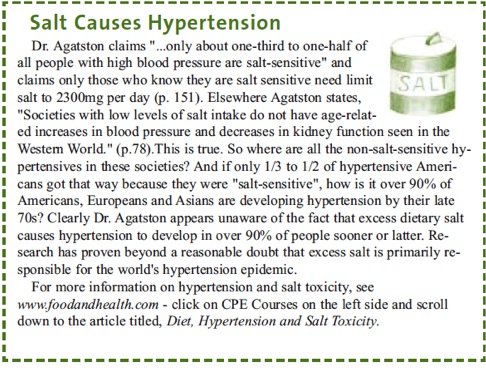South Beach Diet Heart Program
Dr. Arthur Agatston has written a new book about preventing and treating America?s #1 killer ? heart disease. Most know Dr. Agatston as a cardiologist turned diet guru who wrote the best selling South Beach Diet (SBD). With his new book, The South Beach Diet Heart Program, Dr. Agatston focuses more on a topic he knows a lot about ? namely coronary artery disease (CAD).
Dr. Agatston does an excellent job of describing why modern cardiology is costing Americans billions of dollars in costly heart surgeries (angioplasty and bypass) that provide patients with little or no protection against future heart attacks and often do more harm than good. Dr. Agatston is at his best when describing how useless heart surgeries are in most cases for treating CAD and preventing future heart attacks and strokes and how heart surgeons misrepresent the facts about their effectiveness to convince patients to undergo these procedures.He also does an excellent job of explaining how modern screening tests can identify those at high risk of CAD earlier and how drugs can be used in addition to diet and lifestyle changes to dramatically cut the risk of heart disease and stroke.Unfortunately for Dr. Agatston, one cannot really talk about treating and preventing CAD without talking about diet and the prominent role diet plays in promoting dangerously clogged arteries. As Dr. Agatston demonstrated so clearly in his first book the SBD his understanding of nutrition science is rudimentary at best. In the original SBD he claimed people would be better off eating French fries or even potato chips rather than a plain baked potato. [See CFFH Newsletter August 2003]. He also claimed foods with a high glycemic index were fattening even though research shows no consistent relationship between a food?s GI and its impact on satiety and calorie intake. In his new book he describes the 3 principles of the SBD on page 153. They are:#1. ?Eat good fats? tells people to consume refined oils such as olive, flaxseed, walnut, canola, and peanut and eat more nuts, avocados and fish.#2. ?Eat good carbs? like fruits, vegetables and whole grains.#3. ?Eat lean protein? like ?eggs, low-fat dairy, nuts, seeds, legumes, white meat poultry, fish, shellfish, and lean cuts of meat.?Certainly eating more high-fat, calorie dense foods like refined oils listed in #1 is a bad idea for weight loss because the more oils one consumes the lower the nutrient density and fiber content of one?s diet. While Agatston claims olive oil lowers LDL (p.148) there is no credible evidence to support his claim. In fact olive oil has 13-14% saturated fatty acids and very little omega-3 fatty acids that do help reduce CVD mortality. One cannot fault his principle #2 but #3 makes me wonder why a cardiologist rightly concerned about higher LDL promoting CAD would recommend eating foods with plenty saturated fat and or cholesterol like eggs, lean meats, poultry, and low-fat dairy products. All these foods raise LDL levels and promote clogged arteries when consumed in place of admittedly bad white bread. Such advice is made more dangerous by the fact that he puts no limits on the amount of these cholesterol-raising, artery-clogging foods during phase 3 of the SBD (that is weight maintenance phase). Oddly enough he does limit nuts and seeds to ?..about one ounce?. a day if you are also trying to lose weight?. Why?Because he says they ??are easy to overdo?.(p. 147). In fact refined fats and oils are even easier to overdo than nuts and seeds and far less nutritious. The addition of ?good oils? to any diet will increase calorie density and reduce nutrient density even more so than the refined carbohydrates he is rightly critical of. If refined carbs are bad because they are calorie dense and nutrient poor and promote weight gain then by the same standard refined oils are worse.
Bottom Line:If you want to know how not to get snookered by a heart surgeon into needless and often damaging heart surgeries Dr. Agatston?s new book provides a much needed expose. If you already have CAD and want to get the most out of your cardiologist again Dr. Agatston?s book is fine. But if you want to know how to best prevent and treat CVD and its risk factors with diet this book is of little value.By James J. Kenney, PhD, RD, FACN.Dr. Agatston claims "...only about one-third to one-half of all people with high blood pressure are salt-sensitive" and claims only those who know they are salt sensitive need limit salt to 2300mg per day (p. 151). Elsewhere Agatston states, "Societies with low levels of salt intake do not have age-related increases in blood pressure and decreases in kidney function seen in the Western World." (p.78).This is true. So where are all the non-salt-sensitive hypertensives in these societies? And if only 1/3 to 1/2 of hypertensive Americans got that way because they were "salt-sensitive", how is it over 90% of Americans, Europeans and Asians are developing hypertension by their late 70s? Clearly Dr. Agatston appears unaware of the fact that excess dietary salt causes hypertension to develop in over 90% of people sooner or latter. Research has proven beyond a reasonable doubt that excess salt is primarily responsible for the world's hypertension epidemic.For more information on hypertension and salt toxicity, seewww.foodandhealth.com - click on CPE Courses on the left side and scroll down to the article titled, Diet, Hypertension and Salt Toxicity.

